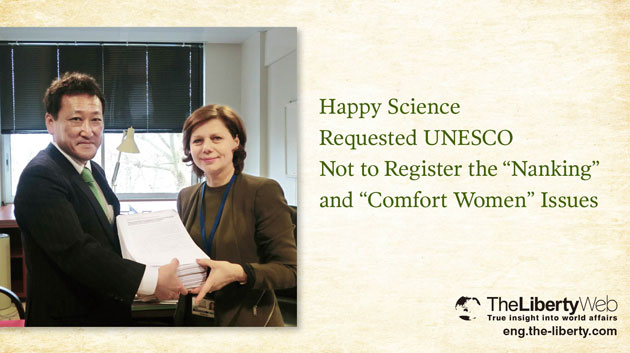Happy Science Requested UNESCO Not to Register the “Nanking” and “Comfort Women” Issues
Mr. Takegawa, (left) of Happy Science International PR Division, hands Ms. Iskra Panevska (right), Senior Programme Specialist for UNESCO’s Memory of the World, documents to protest the registration of the “Nanking Massacre” and the “Comfort Women” issues at the UNESCO Memory of the World Programme.
Last June, it was widely reported that China had submitted to UNESCO’s Memory of the World Programme (MoW) an application to register the so-called “Nanking Massacre” and the “Comfort Women” issues. Responding to this application, Mr. Kazuhiro Takegawa, the Director General of Happy Science International PR Division, visited the UNESCO Headquarters in Paris on 10 February (local time) and requested that China’s application be rejected.
Mr. Takegawa was met by Ms. Panevska, Senior Programme Specialist for UNESCO’s MoW. He explained that the “Nanking Massacre” and the “Comfort Women” issues were fabricated after World War II, and appealed to the organization not to approve the application in order to prevent further discrimination and conflicts. Mr. Takegawa also requested that UNESCO protects itself from politicization and that it makes judgements from a fair and neutral standpoint. He then handed Ms. Panevska the letters addressed to the Director-General of UNESCO, Ms. Irina Bokova, as well as the members of International Advisory Committee (IAC), and the evidential documents written by experts that prove “Nanking massacre” and “comfort women” are not historical facts.
According to Mr. Takegawa, Ms. Panevska said, “UNESCO takes Happy Science’s approach seriously. I will report this matter to the Director-General today.” Mr. Takegawa then received an email from an official in the Office of the Director-General (ODG), confirming that the documents had been received.
The final deliberations concerning the registration of these issues with the MoW are expected to be held when IAC meets this summer.
The “Nanking Massacre” and “Comfort Women” are fabrications
The “Nanking Massacre” is a claim by the Chinese government that the Japanese Army massacred 300,000 people, including civilians, during the Battle of Nanking in 1937. However, historical documents show that Nanking’s population at that time was 200,000 and it would have been impossible to kill 300,000 people. After the battle, public order was restored under the rule of the Japanese Army and Nanking’s population increased to 250,000. Also, recent studies revealed that the photographs, which had been regarded as the proof of the “pogrom” were fabrications and some of them were even unrelated to the event. It is now recognized in Japan that China’s claim is political propaganda.
Last August, Asahi Shimbun, one of Japan’s most influential newspapers, withdrew an article on the “forcible transportation of comfort women,” which had triggered rumblings of blame of the Japanese for this atrocity during WWII, admitting that the testimony of a Japanese male in the article was false. Also The Liberty has repeatedly reported that the “Nanking Massacre” and “comfort women” are NOT historical facts.
UNESCO should protect itself against politicization
In the Preamble of UNESCO’s Constitution it is written, “Since wars begin in the minds of men, it is in the minds of men that the defences of peace must be constructed.” China’s application to register these events is entirely contrary to this philosophy and, far from being “the defence of peace,” by registering fabricated stories which are NOT based on historical facts, it will sow new seeds of discrimination and hatred for the future. Should UNESCO approve this registration, it will be submitting to politicization by China. China’s application also goes against UNESCO’s founding principle, “the objectives of international peace and of the common welfare of mankind.”



















